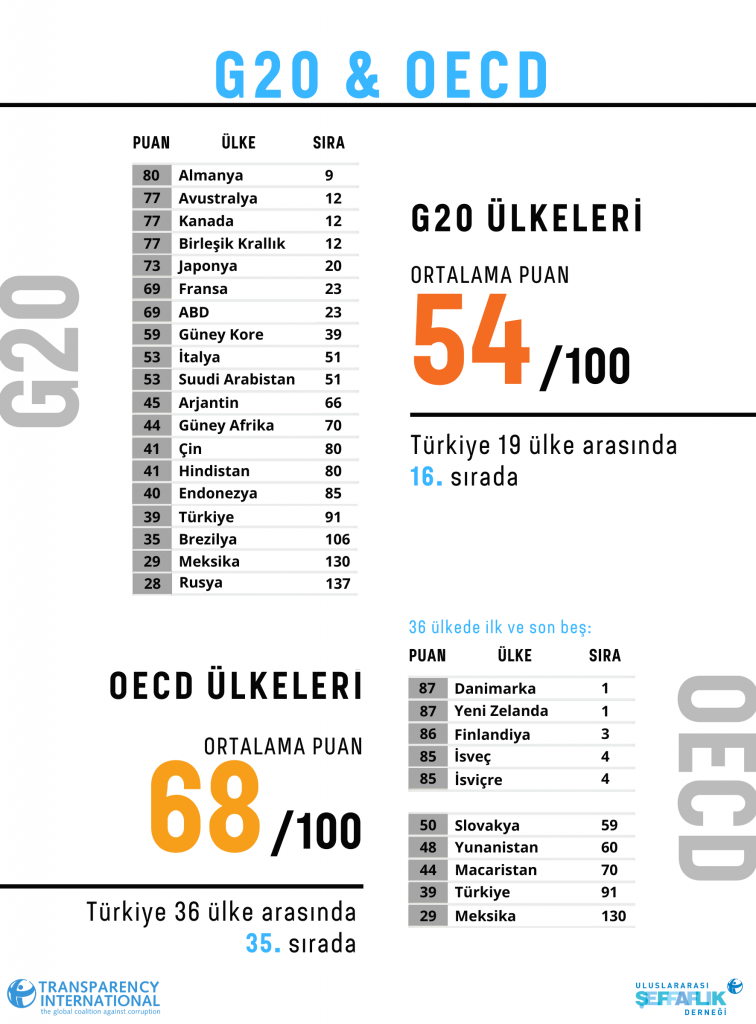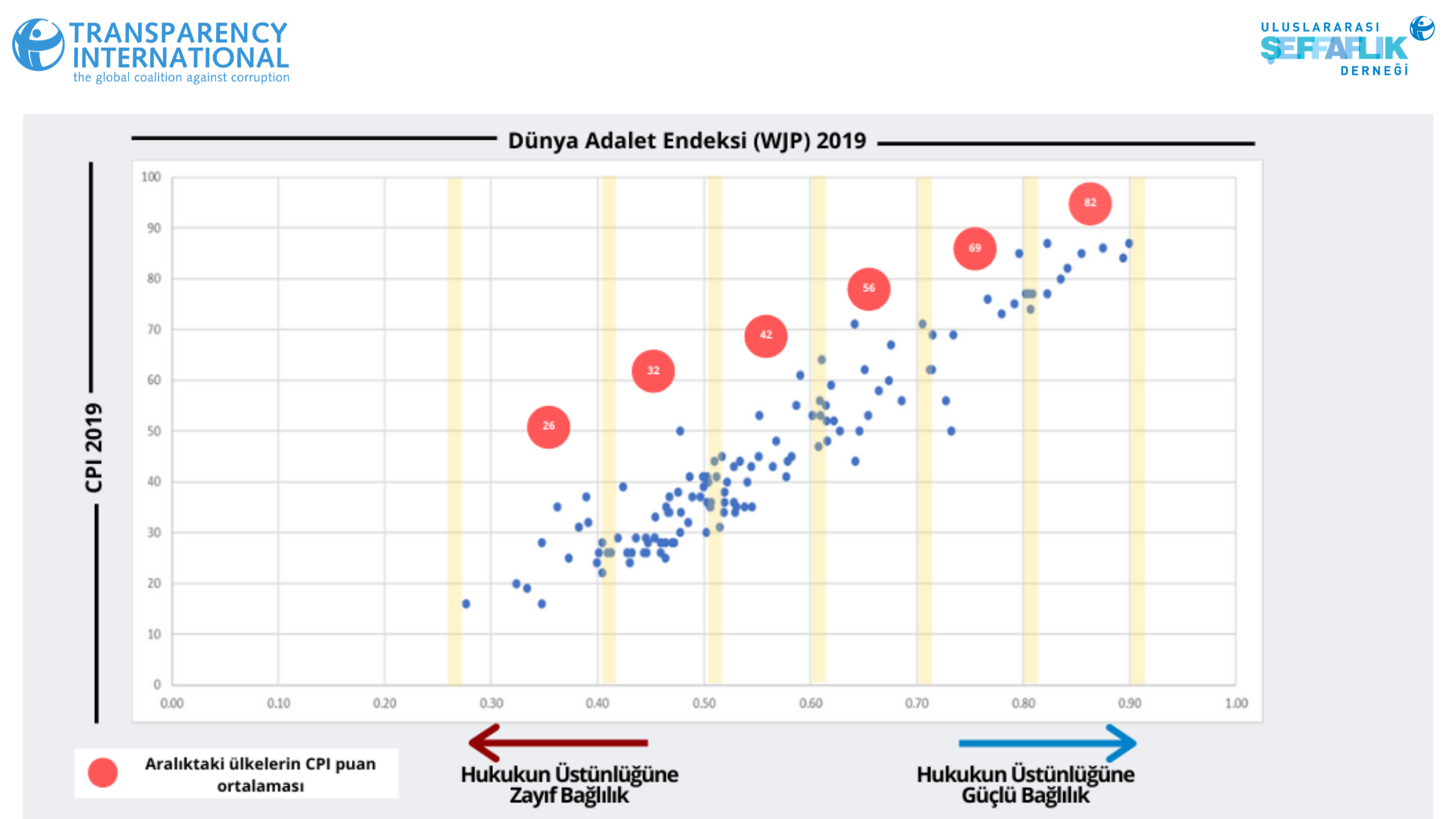Transparency International has just released the 2019 Corruption Perception Index Results!
As one of the leading global civil society organizations in the fight against corruption, Transparency International has published the Corruption Perception Index annually since 1995. Transparency International is active in more than 100 countries across the globe.
This year, with a score of 39, Turkey has dropped to the 91st place out of 180 countries. Compared to last year, Turkey dropped 13 places after having lost 2 points.

Between 2013-2019, with a loss of 11 points and 38 places, Turkey is one of the 3 countries with the most score and ranking loss. Hungary (-10), Turkey (-11) and Saint Lucia (-16) are the countries that have lost the most scores between 2013-2019. New Zealand (87), Denmark (87) and Finland (86) are at the top of the index. Venezuela (16), Yemen (15), Syria (13), South Sudan (12) and Somalia (9) are the countries with the highest corruption perception, placed on the bottom of the index. Transparency measurements of political finance and research on the level of inclusion and participation of decision-making processes overlap with the 2019 Corruption Perception Index results. Increasing illegal money flows associated with political finance are also among the prominent findings.
When compared to 28 EU member states, Turkey fell behind all and the score difference is expanding.

Turkey is placed second to last among 36 OECD member states and fourth to last among G20 countries.

Having placed on top of the list among Eastern European and Central Asian countries in 2013, this year Turkey has dropped to the 5th place.
Several reasons of Turkey’s rapid drop in the Corruption Perception Index are; concentration of power in the executive branch, similarly to autocratic regimes, violations of judicial independence and rule of law, loss of influence and functioning of public institutions, specifically that of agencies conducting checks and balances, and the loss of Parliament’s capacity to hold the government accountable. Policy and decision-making processes are carried out in an increasingly constricted environment. Public participation and influence in political decisions are faltering.

21st century has seen large-scale/political corruption become widespread and anti-corruption mechanisms lose their influence, regarding especially the system of checks and balances and the judiciary. Impunity and the inability of the judiciary to curb corruption effectively are behind the reasons for the fall in the index. The decision of non-prosecution among the decisions issued by the public prosecutor’s offices for the Crimes Against the Reliability and Functioning of Public Administration increased from 44% in 2009 to 54% in 2018. Similarly, the decision of non-prosecution for the Economy, Industry and Trade Related Crimes increased from 29% to %47. In the case of the Crimes Against Public Trust, this rate increased from 23% to 45%[1]. The proliferation of tailor-made legislation and the circumvention of checks and balances and participation mechanisms by legal amendments account for the index results. You can see our infographic on Ministry of Justice Judicial Statistics in Turkey infographic for further information.
With nearly 200 amendments, the Public Procurement Law has moved away from the intended principles of transparency, accountability and honesty, and the proportion of public procurement achieved by means of auditing and fair competition has declined rapidly through the expanded scope of exceptions. The open tender rate, which was 75% in 2004, has fallen to 63% in the first 6 months of 2019. The total proportion of tenders conducted within the scope of negotiated tendering and exceptions increased from 10% to 32% between 2004 and 2019. You can see our infographic on Public Procurement in Turkey for further information. The conduct of public procurement in a manner lacking the necessary transparency, supervision and accountability mechanisms leads to increasing remarks of a crony capitalism in place. The audit of the use of public resources and funding has become unfeasible. Pigeonholing the principles of transparency and participation in economic decisions and the allocation of resources, and the weakness of the legal framework regulating political finance and ethics in politics are increasing the risk of corruption. With the ongoing pressure on media outlets and civil society organizations alongside increasing measures in opposition to electoral integrity, the problems related to corruption continue to spread.
Transparency International Board Member and Transparency International Turkey Chair E. Oya Özarslan has commented on the 2019 CPI results saying
“Turkey is experiencing a critical process with corruption. Our country has hit the lowest place in its history, at the 91st place among 180 countries with 13 place-drop over a single year. On the one hand, this situation deepens increasing concerns about the distribution of public resources, creating social inequalities. On the other hand, it reduces our country’s competitiveness and capacity to attract investments compared to other countries. It is crucial to return to a fully functioning democratic system where institutions and rules as well as a system of checks and balances are in place.”
[1] The Crimes Against the Reliability and Functioning of Public Administration comprise 14 different crimes, from bribery to securing benefit in a work of which the performance is beyond authorization. Economy, Industry and Trade Related Crimes comprise 7 different crimes such as corruption in tenders and involvement in fraudulent act during fulfillment of obligations. Crimes Against Public Trust comprise 12 different crimes such as counterfeiting money and official documents. Detailed information can be found on Turkish Penal Code, art. 197-212, 235-242 and 247-266.
We’ve compared the CPI results with other known indexes!
The prevalence of tailor-made activities in legislature and the counterbalancing of mechanisms of checks and balances and of participation via legal amendments account for the parallels between the WJP Rule of Law Index and the CPI.
Corruption becomes more common as the rule of law weakens!

As the country scores increase in The Economist Intelligence Unit (EIU) Democracy Index (2019), Corruption Perception Index (CPI) scores also increase.
Corruption becomes more widespread as the commitment to democracy decreases!

If you want to view our press release in a pdf format, please click here.



